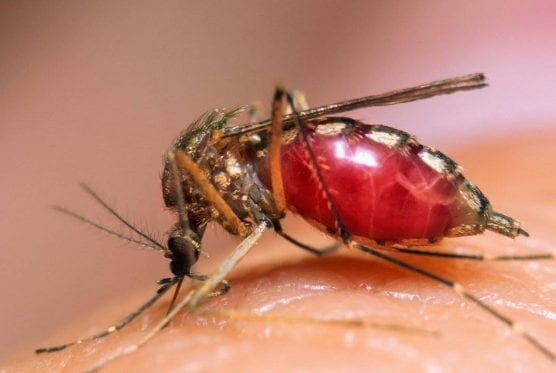The Los Angeles County Department of Public Health has identified the first two cases of human West Nile virus infection in Los Angeles County for the 2019 season (excluding Long Beach and Pasadena as cases identified in those cities are reported by their local health departments).
A resident of the San Fernando Valley region and a resident of the southeastern region of Los Angeles County are recovering after becoming ill at the end of July.
“We are glad to hear that these two people are recovering from their West Nile Fever infections and wish them well. Every year in Los Angeles County, we see cases of West Nile virus infection, which can be serious even deadly, especially for people over 50 and those who have existing health problems,” said Muntu Davis, MD, MPH, Health Officer for Los Angeles County.
“Mosquito bites aren’t just annoying, they may make you sick,” Davis said. “So, everyone should take protective action by using mosquito repellent when outdoors and getting rid of items in their homes or yards that collect standing water where mosquitoes can breed.”
There were no West Nile-infected mosquitoes or humans infected by the virus reported in Santa Clarita last year, according to the Greater Los Angeles County Vector Control District’s public information office.
West Nile virus is spread by the bite of an infected mosquito. Symptoms may include fever, headache, nausea, body aches, and a mild skin rash. WNV can affect the nervous system and result in meningitis, encephalitis, paralysis and even death.
People older than 50 years of age and those with chronic health problems are at higher risk of severe illness. While not all mosquitoes carry this virus, the type of mosquito that spreads this virus is found throughout Los Angeles County.
Public Health recommends the following actions to reduce the risk of West Nile virus infection:
* Avoid mosquito-infested areas at dawn and dusk.
* Consider wearing long-sleeved shirts and long pants when you are outdoors, particularly at these times and when in areas where more mosquitoes are present.
* Use Environmental Protection Agency (EPA)-registered repellents containing DEET, picaridin, or oil of lemon eucalyptus. These are effective defenses against mosquitoes when used as labeled.
* Check your window screens for holes to make sure that mosquitoes cannot enter your home.
* Dump stagnant water. Do not allow water to collect and stagnate in old tires, flowerpots, swimming pools, birdbaths, pet bowls, or other containers. These are prime breeding grounds for mosquitoes.
* Clean and chlorinate swimming pools; drain water from pool covers.
* Stock garden ponds with goldfish or other mosquito-eating fish. These eat mosquito eggs and larvae.
* Empty and wash birdbaths and wading pools weekly.
* Cover rain barrels and empty weekly.
The number of people infected with WNV each year in LA County is estimated to be more than 10,000 because most infected persons do not experience any illness or perhaps only mild illness. These cases are neither reported nor recognized as WNV.
Moreover, Public Health continues to report elevated numbers of WNV cases in LA County over the previous five years, at an average of 197 cases per year. More than three-quarters of reported cases have had severe disease and approximately 7% of patients with severe WNV have died from complications. The longest recorded WNV season extended through mid-December in 2017.
Public Health collaborates with local vector control agencies to target areas for mosquito control activities as well as educate people about how to protect themselves. There is no vaccine for WNV and no treatment to cure the illness once an individual becomes sick. Reduction of mosquito breeding sources and protection from mosquito bites are the best ways to prevent WNV infection.
“It’s important to remember that West Nile virus is transmitted by infected mosquitoes,” says Truc Dever, General Manager of the Greater Los Angeles County Vector Control District. “That’s why residents need to take measures to prevent mosquito bites. Remember to tip and toss anything that can hold water on your property and use insect repellent when mosquitoes are present. Reducing the risk of mosquito-borne disease infection is a shared responsibility for everyone who lives, works, and recreates in LA County.”
For more information on West Nile virus, visit http://publichealth.lacounty.gov/media/westnile. To find a local vector control district, visit http://www.socalmosquito.org.
Stagnant swimming pools or “green pools” should be reported to the Public Health Environmental Health Bureau at 626-430-5200, or to a local vector control agency. Dead birds may be reported by calling 877-968-2473 or online at http://www.westnile.ca.gov/report_wnv.php.
Like this:
Like Loading...
Related





 Tweet This
Tweet This Facebook
Facebook Digg This
Digg This Bookmark
Bookmark Stumble
Stumble RSS
RSS


























REAL NAMES ONLY: All posters must use their real individual or business name. This applies equally to Twitter account holders who use a nickname.
0 Comments
You can be the first one to leave a comment.